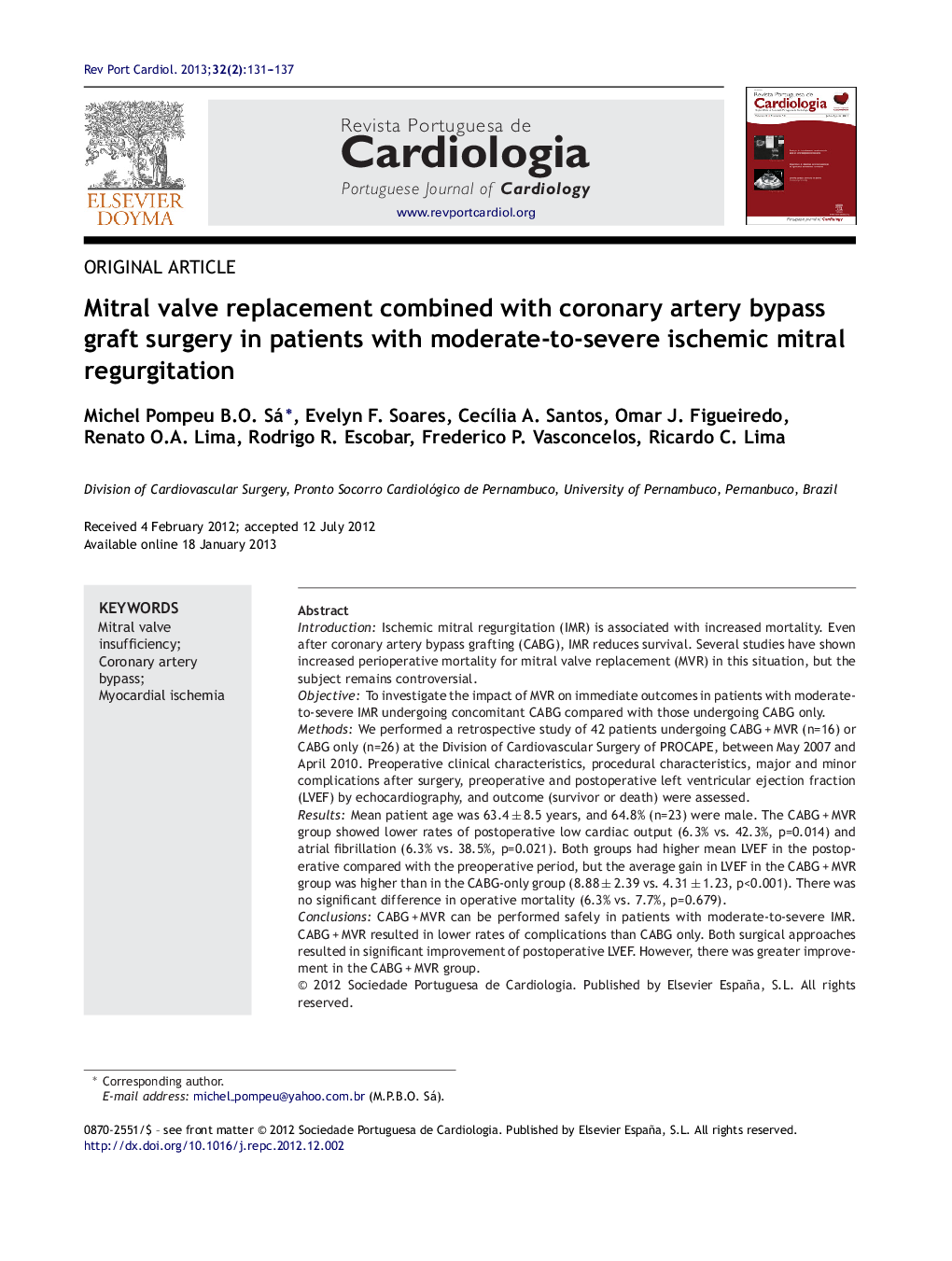| Article ID | Journal | Published Year | Pages | File Type |
|---|---|---|---|---|
| 1126470 | Revista Portuguesa de Cardiologia | 2013 | 7 Pages |
IntroductionIschemic mitral regurgitation (IMR) is associated with increased mortality. Even after coronary artery bypass grafting (CABG), IMR reduces survival. Several studies have shown increased perioperative mortality for mitral valve replacement (MVR) in this situation, but the subject remains controversial.ObjectiveTo investigate the impact of MVR on immediate outcomes in patients with moderate-to-severe IMR undergoing concomitant CABG compared with those undergoing CABG only.MethodsWe performed a retrospective study of 42 patients undergoing CABG + MVR (n=16) or CABG only (n=26) at the Division of Cardiovascular Surgery of PROCAPE, between May 2007 and April 2010. Preoperative clinical characteristics, procedural characteristics, major and minor complications after surgery, preoperative and postoperative left ventricular ejection fraction (LVEF) by echocardiography, and outcome (survivor or death) were assessed.ResultsMean patient age was 63.4 ± 8.5 years, and 64.8% (n=23) were male. The CABG + MVR group showed lower rates of postoperative low cardiac output (6.3% vs. 42.3%, p=0.014) and atrial fibrillation (6.3% vs. 38.5%, p=0.021). Both groups had higher mean LVEF in the postoperative compared with the preoperative period, but the average gain in LVEF in the CABG + MVR group was higher than in the CABG-only group (8.88 ± 2.39 vs. 4.31 ± 1.23, p<0.001). There was no significant difference in operative mortality (6.3% vs. 7.7%, p=0.679).ConclusionsCABG + MVR can be performed safely in patients with moderate-to-severe IMR. CABG + MVR resulted in lower rates of complications than CABG only. Both surgical approaches resulted in significant improvement of postoperative LVEF. However, there was greater improvement in the CABG + MVR group.
ResumoIntroduçãoA Regurgitação mitral isquémica (RMI) está associada ao aumento da mortalidade. Mesmo após a cirurgia de revascularização miocárdica (CRM), reduz a sobrevida. Vários estudos enfatizam o aumento da mortalidade perioperatória com troca valvar mitral (TVM) nesta situação, mas isto ainda é controverso.ObjetivoInvestigar o impacto da TVM nos resultados imediatos em pacientes com RMI moderada a grave submetidos à CRM em comparação com aqueles submetidos à CRM apenas.MétodosEstudo retrospetivo de 42 pacientes submetidos à CRM + TVM (n = 16) ou CRM isolada (n = 26) na Divisão de Cirurgia Cardiovascular do PROCAPE, de maio de 2007 a abril de 2010. Foram avaliadas características clínicas pré-operatórias, características do procedimento, complicações após a cirurgia, fração de ejeção do ventrículo esquerdo (FEVE) pré e pós-operatório pelo ecocardiograma e evolução (sobrevivência ou óbito).ResultadosA idade média dos pacientes foi de 63,4 anos (± 8,5), sendo 64,8% (n = 23) do sexo masculino. O grupo CRM + TVM apresentou menores taxas de baixo débito cardíaco no pós-operatório (6,3 versus 42,3%, p = 0,014) e fibrilação atrial (6,3% versus 38,5%, p = 0,021). Ambos os grupos apresentaram maior média de FEVE no pós-operatório em comparação com o período pré-operatório; no entanto, o ganho médio da FEVE no grupo CRM + TVM foi maior em comparação com o grupo CRM isolada (8,88 ± 2,39 versus 4,31 ± 1,23, p < 0,001). Não houve diferença significativa nas taxas de mortalidade operatória (6,3 versus 7,7%, p = 0,679).ConclusõesCRM + TVM pode ser realizada com segurança em pacientes que têm RMI moderada a grave. CRM + TVM resultou em menores taxas de complicações do que a CRM isolada. Ambas as abordagens cirúrgicas resultaram em melhoria significativa da FEVE pós-operatória, por outro lado, houve maior ganho no grupo CRM + TVM.
